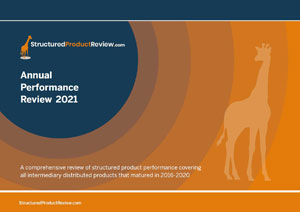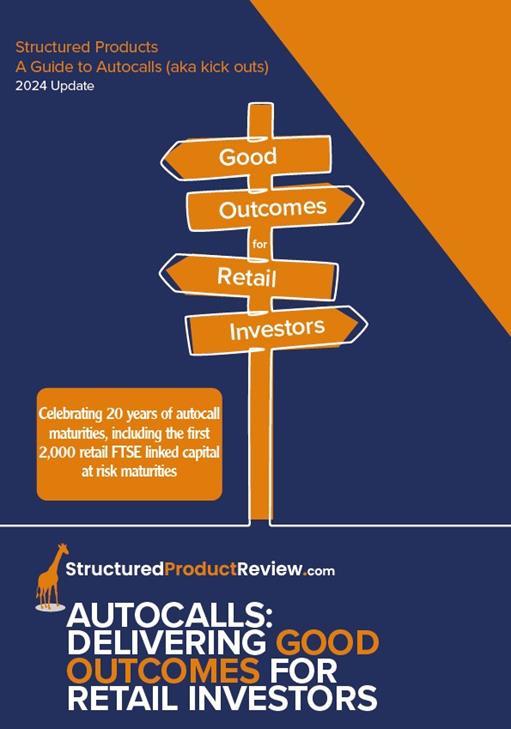Max Darer, Lowes Financial Management, 23/11/2022
2022 has been a turbulent year for markets, with double digit inflation figures rightly taking the headlines. The UKs latest statistics, reported as a 41-year high, stem from a variety of issues including the covid related supply chain bottle necks and the weaponization of energy from Russia’s invasion of Ukraine. These geopolitical events have exacerbated the Bank of England’s challenge to get inflation back to its 2% target and all of this has helped fuel market volatility.
This volatility coupled with dramatically increasing bank funding rates has benefitted the structured product sector. Favourable pricing has resulted in a significant upturn in the availability and suggested popularity of structures.
However, many of the new offers in the UK retail space continue the trend of autocalls offering shorter maximum investment terms of five years. A trend which commenced following the market correction of 2020.
In 2022 this trend is apparent when assessing the issuance of FTSE 100 linked capital-at-risk autocall plans being the primary plan type in the UK retail space. Year to date, 322 such plans had been issued into the retail space with 42.5% having a maximum duration of just five years. For context, just one maximum five-year plan was issued in the seven years up to and including 2020.
Catastrophic events such as the pandemic and the invasion of Ukraine, highlight the importance of extended maximum investment terms. The logic is simple, an extended maximum term of say eight to ten years gives a greater potential for the investment to mature with a gain, whilst deferring the ultimate loss determination date. By definition, this can prove beneficial in hostile or uncertain market conditions when investors in autocalls can be well rewarded for their time in the markets. While we can but speculate what the market will do tomorrow, we can be comforted by the fact that time is the biggest healer.
To validate our stance, we firstly look back across the twenty-year evolution of the UK sector, observing that of the 1,500 FTSE 100 linked capital at risk autocalls that have matured, only eight failed to realise a gain but this figure would have been just one had the maximum terms been seven years. And then we look forward to 2023…
In 2023 fifteen FTSE 100 linked capital-at-risk autocalls that have failed to mature early will reach their final index observation dates. All of these are maximum six-year contracts and based on the level of the Index at the time of writing [1], only three of these will mature with a gain.
Whilst none of these plans are on track to mature with a loss, a no-gain maturity is far from ideal. These will be the first FTSE linked capital-at-risk plans to do so since 2013 when eight shorter term contracts were left with insufficient duration to recover from the Black Swan that was the global financial crisis.
To summarise, our message remains the same – the more time, the better! Whilst ultimately, we hope that the marker recovers enough so that no shorter term autocalls are caught by adverse conditions to loss-making effect, we will continue to advocate the obvious benefit in the extended maximum term.
The 10:10 Plan was designed to provide the longest possible duration of up to ten years to reduce the prospect of a no-gain maturity. The latest 10:10 Plan offers three investment options and details of these together with other plans available in the retail space can be accessed here.
[1] Closing level recorded on 21st November 2022. Data sourced Investing.com
Structured investments put capital at risk.
Past performance is not a guide to future performance.
Disclosure of interests: Lowes has provided input into the concept, development, promotion and distribution of the 10:10. Lowes has a commercial interest in these investments as a result of its involvement. Where Lowes is involved in advice on these investments to retail clients, it will not receive benefit of any fees for its involvement, other than those fees payable by the client to Lowes.
Also in this section
- How old is too old? Are structured products to die for?
- Product focus - October 2024
- Q3 2024 Issuance
- Q3 2024 maturity results
- A share of spread bets on steroids?
- Product focus - September 2024
- Maturities of the month - August 2024
- Right on time
- Product focus - August 2024
- Keep calm and zoom out
- 2,000 and counting
- Q2 2024 maturity results
- 20 years of autocall maturities
- Product focus - June 2024
- Fixed income or interest?
- Maturities of the month - May 2024
- The barrier debate - revisited
- Product focus - April 2024
- Maturities of the month - April 2024
- Time to call
- I don't believe markets are ever too high for Structured products!
- Notes on counterparty exposure
- Return of Nikkei
- Q1 2024 issuance
- Q1 2024 maturity results
- Structured Products – AAAAAGH!
- Hop in CIBC
- Re-enter Santander
- How to build a financial fortune - revisited
- Issuance in 2023
- Where's the risk?
- Questionable offerings
- Challenging the case against structured products - 'Loss of dividends'
- Navigating the investment landscape
- Challenging the case against structured products - Counterparty risk
- 6-year autocalls approaching final destination
- 1,750 FTSE capital at risk autocall maturities
- The leopard that changed her spots
- Q3 2023
- Challenging the case against structured products - Keydata
- Dilemmas for UK IFA's and the unique role of Structured Products
- 'High charges'
- Precipice bonds
- Intro
- FTSE 100 Contingent Income
- Indexing the indices
- Something different
- Investing through volatility
- 100 10:10s
- The best or worst?
- The 10%/25% 'Rule' that never was
- Structured products and the yield curve
- Fixed income: Capital at risk?
- Prospects for UK inflation - and fun with A.I!
- The Barrier Debate
- More Deposits for now
- Last of the Americans
- What if?
- Time heals all wounds, we hope...
- How to diversify portfolios using structured products?
- The Proof Is In The Pudding...
- Debunking Structured Misconceptions
- 1,500 FTSE Capital-at-Risk Autocall Maturities
- Q3 2022 Maturity Results
- What do we prefer?
- Deposits vs Capital ‘Protected’
- There’s time yet…
- Where did you invest your clients?
- A Six-Month Reflection
- Return of the Rev Con
- Happy 2nd Birthday FTSE CSDI
- Q2 2022 Maturity Results
- The best and worst yet still the best
- Critique my Suitability - Mariana 10:10 Plan June 2022 (Option 2)
- 10/10 for 55 10:10’s
- Q1 2022 Maturity Results
- 'How to build a financial fortune': a follow up
- Critique my Suitability - Mariana 10:10 Plan April 2022 (Option 2)
- 2021 Capital-at-Risk Autocall Maturity Review
- An unwelcome return...
- CSDI's First Birthday
- Bon Anniversaire
- Introducing the FTSE Custom 100 Synthetic 3.5% Fixed Dividend Index
- Q3 2021 Maturity Results
- Critique my Suitability - Mariana 10:10 Plan October 2021 (Option 2)
- Blurring the lines...
- Beware of false knowledge; it is more dangerous than ignorance
- Good news, bad news...
- Certainty is Certainly a Benefit
- Critique my Suitability - Mariana 10:10 Plan September 2021 (Option 2)
- A Twenty-Year Progression
- Q2 2021 Maturity Results
- Nine 8:8s Post Positive Returns in Falling Markets
- Critique my Suitability
- Q1 2021 Maturity Results
- Morgan Stanley’s Marvelous Maturity Medley
Current Products
We review the UK's retail structured investment sector, providing pertinent support for Professional Advisers and relevant research tools.
View all ⟶


